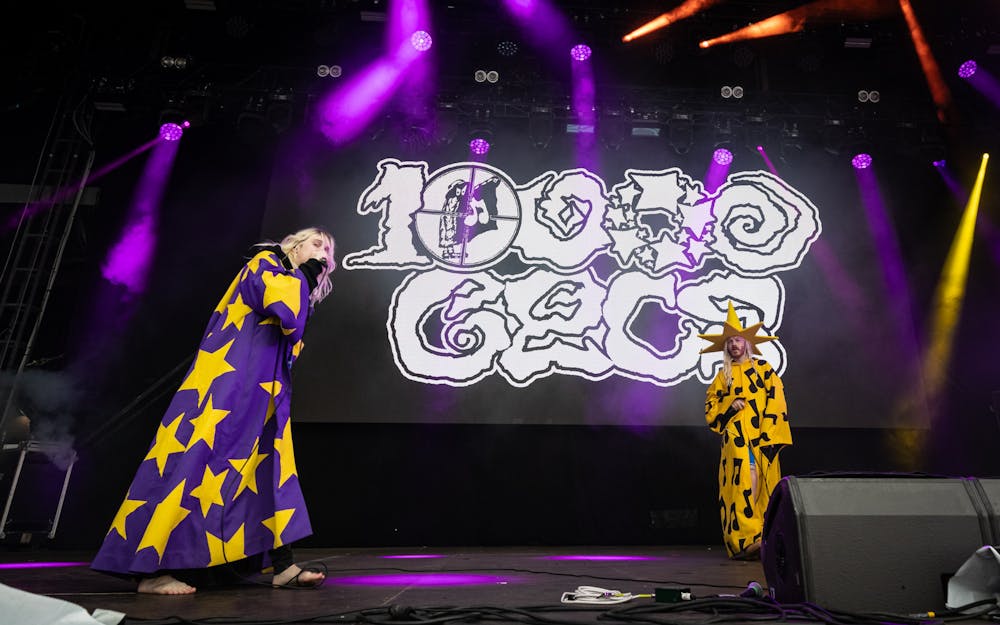100 gecs, the hyperpop duo consisting of Laura Les and Dylan Brady, have been reinventing what modern music can be since 2010, when they first met in their hometown of St. Louis. After getting their start at digital music festivals hosted on Minecraft, 100 gecs finally found their big break with the release of their 2019 debut album “1000 gecs.” Featuring hits like “Money Machine,” “Hand Crushed by a Mallet” and “Stupid Horse,” the record defied notions of contemporary music etiquette, opting instead for abrasive electronic instrumentation and distorted, high-pitched “nightcore” vocals. But this sound isn’t just insane for insanity’s sake — it’s central to the identity of the artists behind the music. Les once explained in an interview that pitching up her vocals helps her feel more comfortable with her identity as a transgender woman, an exploration that dates back to some of her earliest SoundCloud releases, such as “how to dress as human.”
The gecs’s newest release, “10,000 gecs,” shows substantial development in the duo’s sound and identity: While their characteristic high-pitched vocals are still very much in the mix, they are no longer ubiquitous. Listeners are granted glimpses into the raw, unfiltered emotive power of Les’s voice while Brady maintains the group’s signature absurdist energy. Unlike in past releases, their backing in “10,000 gecs” is not entirely computer-generated. Electric and acoustic guitar, along with funky bass and disco drum beats, populate the mix and demonstrate that 100 gecs are not a one-trick pony afraid of evolution.
“10,000 gecs” is most exemplary in its energy, matching that of the grunge and punk music that took American suburbia by storm from the late ’70s to the early ’90s. But while that music appealed to a skateboarding, spray-painting crowd of teenagers rebelling against their parents, the gecs appeal to today’s disaffected youth who spent their childhoods playing Minecraft and developing social anxiety. To be very clear, this is far from a dig at the group’s sound. In fact, it’s the opposite: 100 gecs are able to capture an increasingly prevalent cultural sound and attitude to a degree that requires distance from mainstream music. This comes through in the album’s sounds, which range from harsh screeches and overproduced upbeat horns to brief breakthroughs of truly beautiful acoustic guitar. No other music can quite match the way 100 gecs bottle up the unique absurdity of life in the digital age.
The album begins with “Dumbest Girl Alive,” which greets listeners with the blaring “THX” sound effect. The mix then comes in with an energetic rock guitar riff complimented by harsh drums and video game-like electronic sound effects. This intensity is then countered by acoustic breakdowns that slowly build into the song’s highest peaks. Following this song is “757,” the most traditionally gecs-sounding track of the album’s 10 songs.
“Hollywood Baby,” one of the album’s standout numbers, is next. It’s a perfect example of 100 gecs’s unrivaled energy as an increasingly distorted reiteration of “you’ll never make it in Hollywood, baby” eventually breaks into gorgeous all-out chaos.
The album’s streak of instant classics continues with “Frog On The Floor.” While a substantial energy shift from the album’s first three tracks, the song still encapsulates everything that makes 100 gecs the most interesting group currently making music. The song mixes the strangely complementary sounds of ska and a children’s educational program theme song, then morphs into a slow-jam funk beat backed by distorted “ribbits” voiced by Les. The song is exactly as its title suggests: the account of a frog on a floor. And while you could try to break down the frog to represent something greater, that doesn’t seem to be what 100 gecs is going for. The energy of the song’s composition with its wacky lyrics is all that is needed for a good time.
Next is “Doritos & Fritos,” chock-full of catchy lyrics and funky guitar rhythms, followed by “Billy Knows Jamie,” with guitar lines and vocals that feel derivative of Rage Against the Machine and Beastie Boys. But just as these motifs start to wear, listeners are smacked on the head with heavily distorted electronic metal riffs filled in with harsh vocals that, if you forget to check the volume, will blow out a speaker — or an eardrum. After this comes “One Million Dollars,” a song entirely made up of samples, bass drops, distorted record scratches and the occasional clear guitar line hidden underneath abrasive electronic noise.
The two songs before the album’s finale are nothing more than hilarious lyrics backed by experimentation in a variety of musical styles. The first, “The Most Wanted Person In The United States,” is a laid-back hip-hop track with nonsensical lyrics, good rhythm and a solid beat. It’s followed by “I Got My Tooth Removed,” which opens as an emotional, somber ballad. Then, the beat drops and the track is revealed to be another youthful ska song about getting a tooth pulled.
The album’s final track “mememe,” with the only true thematic message in the record, strongly concludes a monumentally great album. It reignites the conversations about identity that formed the earliest moments of 100 gecs’s career, but while Les’s vocals were heavily distorted on those songs, her verse on “mememe” is mostly with natural vocals, making it the most emotionally raw song of the gecs’s entire discography.
“10,000 gecs” is a new dawn for 100 gecs, as the album demonstrates that the duo can continually incorporate new instrumentation and musical ideas while still maintaining the core energy that makes them so special. Everything that 100 gecs makes feels both entirely original and also the result of years of perfectionist rehearsal. Their sounds push the limit of what can be aurally palatable, but they always end up on the right side of being absolutely awesome.

Finn Kirkpatrick was the senior editor of multimedia of the Brown Daily Herald's 134th editorial board. He is a junior from Los Angeles, California studying Comparative Literature and East Asian Studies. He was previously an arts and culture editor and has a passion for Tetris and Mario Kart.





